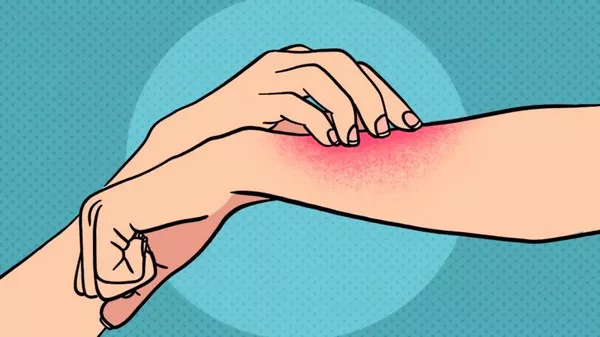Eczema, also known as atopic dermatitis, is a chronic skin condition characterized by dry, itchy, and inflamed skin. Managing eczema involves not only treating the symptoms but also understanding and addressing the underlying triggers. Itching, one of the hallmark symptoms of eczema, can be intense and disruptive to daily life. In this comprehensive guide, we will explore various strategies, treatments, and lifestyle changes that can help you effectively manage and reduce itching associated with eczema.
Understanding Eczema Itching
Before delving into treatments, it’s crucial to understand why eczema causes itching. Eczema is often linked to a compromised skin barrier, which allows moisture to escape and allergens or irritants to penetrate the skin more easily. This leads to inflammation and triggers the itching sensation. Scratching provides temporary relief but can worsen the condition by further damaging the skin barrier and increasing inflammation.
Common Triggers of Eczema Itching
Identifying triggers that exacerbate eczema itching is essential for effective management. Common triggers include:
- Allergens: Pollen, dust mites, pet dander, and mold can trigger eczema flare-ups.
- Irritants: Harsh soaps, detergents, fragrances, and certain fabrics (like wool or synthetic fibers) can irritate sensitive skin.
- Climate and Weather: Dry air, low humidity, heat, and sweat can aggravate eczema.
- Stress: Emotional stress and anxiety can trigger or worsen eczema symptoms.
- Food Allergens: Certain foods, such as dairy, nuts, and gluten, may trigger eczema flare-ups in some individuals.
- Microbes: Bacterial or viral infections can exacerbate eczema symptoms and itching.
Effective Strategies to Stop Itching
1. Moisturize Regularly
One of the most effective ways to reduce eczema itching is to keep your skin moisturized. Moisturizers help restore the skin barrier, prevent moisture loss, and soothe dry, irritated skin. Opt for fragrance-free, hypoallergenic moisturizers that are designed for sensitive skin. Apply moisturizer immediately after bathing to lock in moisture.
2. Use Topical Corticosteroids
Topical corticosteroids are commonly prescribed to reduce inflammation and itching associated with eczema flare-ups. They come in varying strengths and formulations (ointments, creams, lotions) depending on the severity of your symptoms. Follow your dermatologist’s instructions for proper application to avoid potential side effects such as skin thinning.
3. Try Topical Calcineurin Inhibitors
Topical calcineurin inhibitors, such as tacrolimus (Protopic) and pimecrolimus (Elidel), are non-steroidal medications that can effectively reduce inflammation and itching in eczema-prone areas. They are often recommended for sensitive areas of the skin, such as the face and genitals, and can be used as maintenance therapy to prevent flare-ups.
4. Take Oral Antihistamines
Oral antihistamines, such as cetirizine (Zyrtec), loratadine (Claritin), or diphenhydramine (Benadryl), can help alleviate itching associated with eczema by blocking histamine receptors in the body. They are particularly useful if itching disrupts your sleep or daily activities. Consult your doctor for the appropriate dosage and type of antihistamine suitable for you.
5. Use Wet Wrap Therapy
Wet wrap therapy involves applying a moisturizer or topical medication to the affected skin, followed by a layer of damp clothing or bandages, and then a dry layer on top. This technique helps hydrate the skin and enhance the absorption of medications, providing relief from itching and promoting healing. It’s essential to follow proper instructions to avoid skin irritation or infection.
SEE ALSO: What Are 10 Trigger Foods for Eczema?
6. Practice Good Skincare Habits
Developing a skincare routine tailored to eczema-prone skin can help minimize itching and flare-ups. Here are some tips:
- Use gentle cleansers: Avoid harsh soaps and cleansers that can strip the skin of natural oils. Opt for mild, fragrance-free cleansers formulated for sensitive skin.
- Avoid hot baths/showers: Hot water can further dry out the skin. Instead, use lukewarm water for bathing and limit shower time to 10-15 minutes.
- Pat dry, don’t rub: After bathing or washing, gently pat your skin dry with a soft towel to avoid irritating sensitive skin.
- Choose soft fabrics: Wear breathable, cotton clothing and avoid rough or scratchy fabrics that can irritate the skin.
- Avoid scratching: Keep your nails short and consider wearing cotton gloves at night to prevent scratching while you sleep.
7. Identify and Avoid Triggers
Identifying and avoiding triggers that worsen your eczema can significantly reduce itching and flare-ups. Keep a diary to track your symptoms and identify patterns related to diet, skincare products, environmental factors, and stress. Once identified, take steps to minimize exposure to triggers whenever possible.
8. Manage Stress
Stress can exacerbate eczema symptoms, including itching. Practice stress-reducing techniques such as yoga, meditation, deep breathing exercises, or mindfulness to help manage stress levels. Getting enough sleep and maintaining a balanced lifestyle can also contribute to overall skin health.
9. Consider Phototherapy
Phototherapy, or light therapy, involves exposing the skin to controlled amounts of natural or artificial light under medical supervision. It can help reduce inflammation, itchiness, and the frequency of eczema flare-ups. Phototherapy is typically used when other treatments haven’t been effective or are not suitable.
10. Explore Alternative Therapies
Some individuals find relief from eczema itching through alternative therapies such as acupuncture, aromatherapy, or herbal remedies. While research on their effectiveness for eczema is limited, it’s essential to consult with a healthcare professional before trying any alternative treatments to ensure they are safe and appropriate for your condition.
Conclusion
Managing eczema itching requires a multifaceted approach that includes understanding triggers, adopting effective skincare routines, using appropriate medications, and making lifestyle adjustments. By following the strategies outlined in this article, you can take proactive steps to reduce itching, alleviate discomfort, and improve the overall health of your skin. Remember to work closely with your dermatologist or healthcare provider to develop a personalized treatment plan that addresses your specific needs and concerns. With patience and consistent care, you can effectively manage eczema itching and enjoy healthier, more comfortable skin.
Related Topics:



























